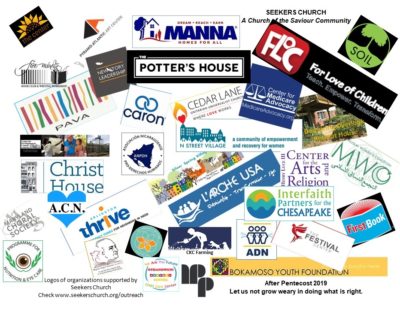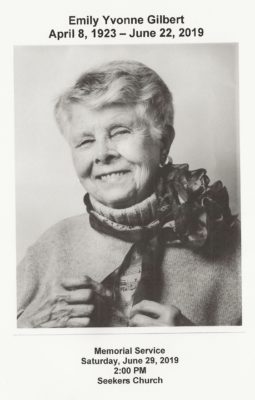Sermons
Seekers recognizes that any member of the community may be called upon by God to give us the Word, and thus we have an open pulpit with a different preacher each week. Sermons preached at Seekers, as well as sermons preached by Seekers at other churches or events, are posted here, beginning with the most recent.
Click here for an archive of our sermons.
Feel free to use what is helpful from these sermons. We only ask that when substantial portions are abstracted or used in a written work, please credit Seekers Church and the author, and cite the URL.
.wp-show-posts-columns#wpsp-4136 {margin-left: -2em; }.wp-show-posts-columns#wpsp-4136 .wp-show-posts-inner {margin: 0 0 2em 2em; } At the outset I want to mention several sources that helped open up this familiar gospel story for me. One is The Jewish Annotated New Testament, second edition, co-edited by Amy-Jill Levine and Marc Zvi Brettler,[i] using their notes and an essay in it, “The Concept of Neighbor in Jewish and Christian Ethics,” by Michael Fagenblat.[ii] The second is Through Peasant Eyes[iii] by Kenneth E. Bailey, a renowned scholar of Middle East cultures, entitled “The Good Samaritan.” And, of course I did peek at the article “Samaritans” in Wikipedia! The gospels of Matthew and Mark contain short passages in which an expert in the Torah, the text of the Five Books of Moses (Genesis through Deuteronomy) and the rabbinical interpretation and commentary on it, asks Jesus which commandment in the Torah is the greatest. Jesus responds, “Love the Most High God with all you heart and with all your soul and with all your mind and strength. That’s the first and greatest commandment and the second is like it, “Love your neighbor as yourself.” The brevity of the anecdotes has led many Christians to believe — erroneously — that Jesus issued a new commandment. Naaman is such an interesting character! Here he is, this great man, a commander of armies under the King of Aram, but he had leprosy. Leprosy was a deadly progressive disease; it was contagious and there was significant risk that those who cared for him, like servants or family members, would get it too. It must have been devastating for a man like Naaman to have an incurable disease. He was used to giving orders and having everyone obey him without question, and yet he was unable to make his sickness go away. And this story might have ended here, with Naaman slowly dying a disfiguring horrible death and taking those he loved with him, except for a young girl from the land of Israel, a captive from one of the raids Aram had conducted against the Israelites. So I want you to imagine the life of this girl. We don’t know her name, indicating that she was very unimportant in the scheme of things. She probably came from a small village close to the border with Aram. She might have been helping her mother do the chores, or taking care of her siblings, or going for water, or feeding the chickens, when these fearsome soldiers came to her village and grabbed her and others in the village and took them away. Away from everything she had ever known. We don’t know what happened immediately after she arrived in Aram, but we know that eventually she ended up serving Naaman’s wife, forced to work for someone she didn’t know and who had taken her from all she knew and loved. She was definitely “a lamb among the wolves.” Emily was quite specific about her wishes for this memorial service: red balloons, lectionary scriptures (whatever they might be on that given week); support the Goodwin House Foundation or Heifer International rather than spending money for fancy flower arrangements; listen to Marion Anderson sing “My Lord, What a Morning” and Simon & Garfunkel’s version of “Bridge Over Troubled Waters.” She was always direct and clear about her preferences. Her choices give us a thumbnail sketch of Emily. Red was simply her favorite color, not a political statement. By choosing the common lectionary, we know she saw herself within the common body of Christians, not someone who needed special attention. Giving to the Goodwin House Foundation and Heifer International empowers people at the margins. She remembered the time when Marion Anderson was not welcome to sing at the DAR Hall, and in response, she provided leadership at the Potter’s House on Columbia Road as a meeting place for people of all kinds: rich and poor, black and white, male and female. During those years, she and Carl also sheltered more than a dozen foster children after their own children were launched. I think she saw herself as a bridge over troubled waters – even though she would not have said that. Listen to the lyrics when it comes later in the service. Peter and I met Emily in 1976, just as the Seekers community was forming. She had just survived cancer surgery and would soon graduate from George Mason as one of the first “nontraditional students” in the women’s studies program. Her feminism ran strong in those days. She was active in the campaign to ratify the Equal Rights Amendment to the Constitution, and she was profoundly disappointed when the Virginia legislature refused to ratify the ERA. In today’s Epistle reading, Paul tells the Galatians that they are called to freedom. He instructs them to stand firm and not use their freedom as an opportunity for self-indulgence. He warns not to submit again to a yoke of slavery. Paul wrote concerning desires of the flesh, which he said were opposed to the Spirit. I know these are controversial passages, with debate over what exactly the Greek word “sarx”, commonly translated into English as “the flesh”, truly means. I won’t touch on this debate, but rather will address a newer type of self-indulgence that makes many of us slaves – a self-indulgence of the mind. It is hardly a new subject. I am talking about the temptation not to stand firm against the ever-increasing seductions of technology, and in particular technology that lures us into easy gratification at the expense of our spiritual and emotional lives. Spiritual and emotional lives that long for, and need, quiet, concentration, and freedom from interruption and distraction. I work as a volunteer chaplain at the Hebrew Home nursing home in Rockville. My biggest task there is leading a weekly Bible Study Class for Christians, which I’ve been doing for 3 ½ years now. (Yes, I teach a Christian Bible Study class at a Jewish nursing home!) I need to mention that I am NOT a Bible scholar, and I wasn’t even a regular Bible reader when this class started – I only started it because I was required to lead a group activity as part of my training, and I didn’t have a better idea. Each week, with the help of one other able-bodied person, I bring 12-18 Christians in wheelchairs together for an hour to study a short passage from one of the Gospels. We spent 2 1/2 years going through the Gospel of Matthew; now we are in the Gospel of John, usually covering 10-15 verses each week that I print out in large print that most (but not all) are able to read.“Borderless Love of My Neighbor” by David Lloyd
 July 14, 2019
July 14, 2019The Fifth Sunday after Pentecost
“Moving the Story Forward: Servants as Leaders” by Brenda Seat
 July 7, 2019
July 7, 2019The Fourth Sunday after Pentecost
Emily Gilbert’s Memorial Service Homily by Marjory Zoet Bankson
June 29, 2019

“The Interrupted and Distracted Mind” by David Novello
 June 30, 2019
June 30, 2019The Third Sunday after Pentecost
“God as I Don’t Understand” by Michele Frome
 June 16, 2019
June 16, 2019Trinity